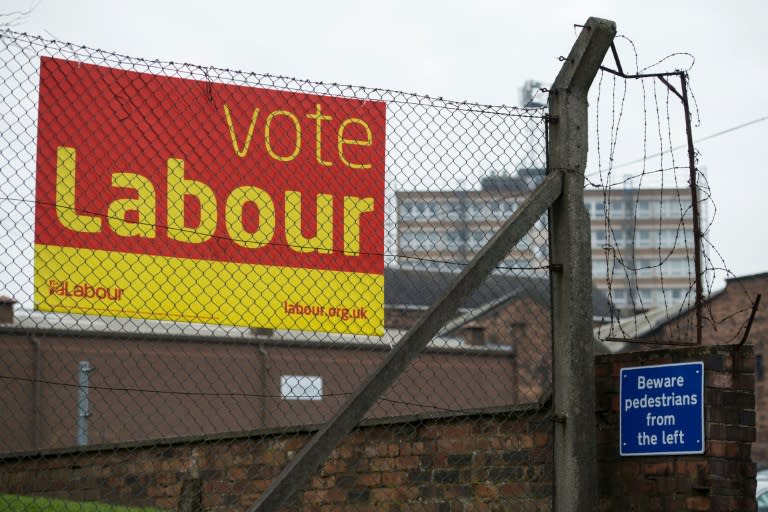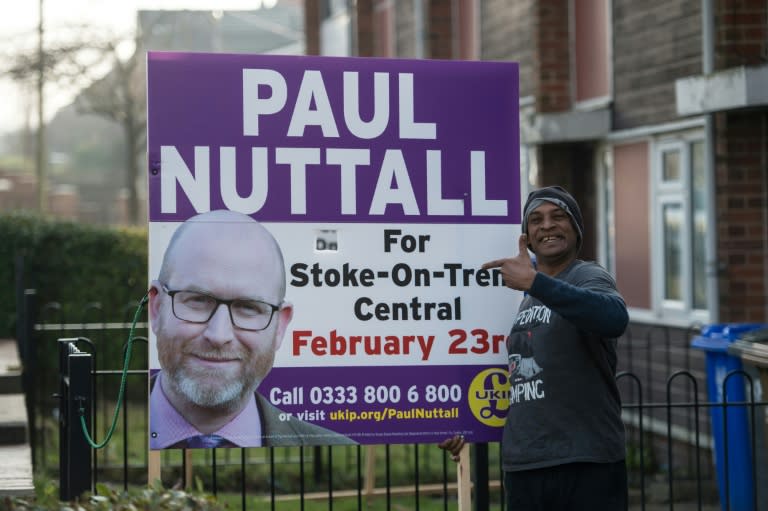UK by-election a battle for survival in Brexit bastion
A knife-edge by-election in the biggest Brexit-backing city will be make-or-break for UKIP and Labour, with both parties struggling to find their role as Britain quits the European Union. Paul Nuttall, the new leader of the UK Independence Party, is himself standing in the battle for Stoke-on-Trent Central constituency, a stronghold for Labour -- currently the main opposition party -- since its creation in 1950. Winning the parliamentary seat would give a huge boost to either UKIP or Labour, offering legitimacy in working-class England. Defeat could send either opposition party spiralling into irrelevance. The disaffection with politics as usual is evident in the West Midlands city, which was once famous around the world as a hub for the pottery industry. "There's no good politician, because all they're interested in is themselves," said Chris Silcock, a plumber who backs Brexit. He was working on a three-bedroom terraced house, its hallway filled with campaign leaflets stuffed through the letterbox. "They thought we'd all just go like sheep and vote to stay in the EU. They'd got no idea. They just didn't listen to the people," the 62-year-old said. "We ought to be able to govern our own country." Of Britain's 30 major cities, Stoke had the highest vote to leave the EU in the June referendum, at 69.4 percent. Nuttall is trying to repurpose UKIP, feeling that their survival post-Brexit depends on replacing Labour as the party of the working class in the former industrial heartlands of the Midlands and north of England -- places just like Stoke. "This may well be one of the key by-elections in British political history," said Mick Temple, a politics professor at Stoke's Staffordshire University. "If Labour lose here, where can they hold on to their seats in the north? "And for UKIP, if they don't win in Stoke-on-Trent, where are they going to win?" - Personal gamble - Nuttall, a 40-year-old former university lecturer, accepts that standing himself is a gamble. "I said I'd lead from the front," said Nuttall, who took over from Brexit figurehead Nigel Farage in November. "This was the first opportunity to fight a by-election. It's deemed to be the capital of Brexit in many ways, so I've put my head above the parapet and I've gone for it," he told AFP. UKIP have taken over a former bakery in the main shopping district as their campaign headquarters, with Nuttall's name and picture emblazoned across the front. In the 2015 general election -- when UKIP won just one of 650 parliamentary seats despite taking 13 percent of the overall vote -- Labour won in Stoke-on-Trent Central with 39 percent, UKIP coming second on 23 percent. But it was the only constituency in Britain where the majority did not vote at all. "The word that we get on the doorsteps more than any is change," Nuttall said. "What we've got to do is to come in, garner those votes and turn the capital of Brexit into the capital of change." - 'Brexit that works' - Bookmakers make Labour candidate Gareth Snell their favourite ahead of Nuttall, with the Conservatives -- the national ruling party -- far behind among the eight other candidates. Snell, a local councillor, backed Britain staying in the EU but accepts the result and says he will not attempt to block its departure. Stoke's heavy Brexit vote "has come from a feeling of being left behind; that things are happening to Stoke rather than with Stoke," he told AFP at his campaign headquarters, in a trade union office. His campaign is focusing on his local roots, the health service and delivering a "Brexit that works". "We've got a plan that we believe will turn Brexit into a host of opportunities and bring the city back to life again," he said. Nuttall's campaign has been engulfed in a storm over claims he was "close personal friends" with fellow Liverpool football supporters who were killed in the 1989 Hillsborough stadium disaster. Snell, meanwhile, has faced questions over some unsavoury tweets. Temple told AFP it was a battle both men had to win, since "it will set the stall for these two parties in the future." "If Labour lose, can Labour ever govern again? If UKIP lose, what's the point in them?" he said.




